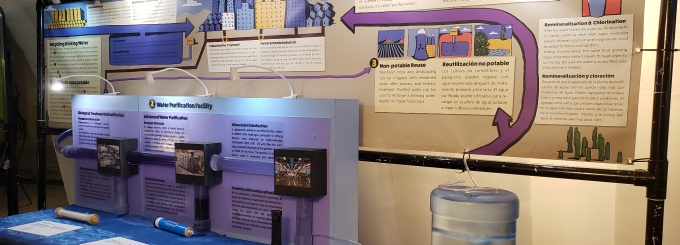MS in EEB - Sustainability Track
Visiting Assistant Professor Marisa Manheim's installation at Canal Convergence, 2022. Courtesy M. Manheim.
The Masters in EEB – Sustainability Track is a research-focused degree program which facilitates the integration of social and natural science approaches to achieving a more just and sustainable future. The program is well suited to those investigating the political and ecological dimensions of environmental transformations, the relationship of science and society in advancing more sustainable futures, and novel approaches to community-based problem solving.
Students will attain expertise in their research area which prepares them for further academic study, as well as the research skills that can contribute to industry, government, and non-profit work.
The Masters requires 36 hours of coursework, typically completed in 2+ years. A culminating thesis is required which makes a new contribution to a given field of study. Students are not required to choose an advisor upon entering the program, however, it is highly recommended that applicants familiarize themselves with faculty research areas to consider alignment with potential advisors for thesis supervision.
Advisory Committee
During the first semester, the student will be assigned an advisor for the purpose of selecting courses, overseeing progress, and later approving the student’s Masters’ research. In the second year, a Committee will be formed, containing a minimum of two EEB faculty members. The Committee evaluates the student’s progress toward completion of the Masters Thesis and reports that progress to the Director of Graduate Studies (DGS). In cases in which the student is not making satisfactory progress, the Advisor can recommend to the DGS that the student be placed on probation. Students on probation will have two semesters to correct the deficiencies identified by the DGS. If they do not do so, they face dismissal.
Coursework
Students are required to complete EVS 501 Fundamentals of Sustainability (3 credits), EVS 553 Foundations of Environment and Sustainability (1 credit) and EVS 554 Professional Development Seminar (1 credit) in their two semesters; as well as enroll in EVS 555 Graduate Colloquium (1 credit) each semester for their first two years. Students must take an approved qualitative and/or quantitative research methods class relevant to their field during their first year in preparation for their thesis work.
Students are then expected to design a program that best fits their particular needs and interests. To promote interdisciplinary training, students are required to take a minimum of one course (3 credits) from the Ecological Dimensions menu and 2 courses (6 credits) from the Social Dimensions course menus below (with option to substitute a course with advisor approval).
Ecological Dimensions
- GEO 515 Conservation Biogeography
- GEO 546 Global Change Ecology
- GEO 570 Integrated Environment Management
- GLY 569 Biogeochemistry and Ecosystem Ecology
- EVS 545 Restoration Ecology
Social Dimensions:
- APY 619 Political Ecology
- COM 640 Risk Communication
- GEO 503 Environmental Governance
- GEO 560 International Development
- EVS 543 Business, Sustainability, and Society
- EVS 560 Leadership in Sustainability
- EVS 570 International Organizations, Gender and Sustainability
- EVS 489 Sustainability & Social Theory
- EVS 589 Emerging Technologies & Sustainability
- EVS 589 Community Resilience to Natural Disasters
- SOC 546 Environmental Sociology
- URP 568 Environmental Planning & Policy
Students are expected to design a program, along with their adviser, that best fits their particular needs and interests. This can be accomplished through coursework, independent study or other experiential learning. The following are a preliminary list of courses likely to be relevant for students in the Sustainability track:
- APY 508 Qualitative Research Methods
- APY 546 Physical Anthropology Special Topics
- APY 547 Behavioral Research Methods
- BIO 500 Bioinformatics/Genome Analysis
- BIO 525 Developmental Evolution
- CIE 500 Economic Perspectives on Engineering Sustainability
- ECO512 Environmental Economics
- ENG 503 Professional Digital Communication
- EVS 509 Advanced Ecology
- GEO 503 Survey Methods for Human Geographer
- GEO 508 Research Methods in Geography
- GEO 577 Environmental Statistics
- GEO 560 Geographical Information Systems
- GLY 558 Macroevolution
- GLY 565 Environmental Remote Sensing
- GLY 569 Biogeochemistry and Ecosystem Ecology
- PSY 634 Animal Behavior
- PSY 640 Animal Communication
- SOC 525 Race & Ethnic Relations
- SOC 511 Social Stratification
- SOC 504 Intro Stats for Social Sciences
- URP 508 Race, Class, Gender and the City
- URP 522 Economic Development Planning
- URP 568 Environmental Planning & Policy
- URP 578 Environmental Planning Methods for Sustainability
The Project/Thesis
The masters thesis is a scholarly paper which makes an original contribution to the field. Every MS student is required to complete a 6-credit written thesis, and present the results orally. Students can choose to complete all 6 credits in a single semester or complete the project over the course of 2 semesters (with approval of their Advisory Committee). Before starting the research, the student should submit a formal project proposal to the advisory committee. This written proposal should begin with an abstract of no more than 300 words and should describe the anticipated research in no more than 7 pages including figures and references. In it the student will present the problem and discuss the plan, objective, approach, and scope of the proposed thesis. In considering the proposal, the faculty will also consider whether the student is adequately prepared for the proposed research. Revisions may be requested at this time. The proposal must be approved by the student’s advisor and Committee. The proposal assures that both the student and the Committee know and agree upon the nature and scope of the research project. Once the project proposal has been approved, the student will be enrolled in the Graduate Research Guidance course for the upcoming semester. Typically, the student will have regular meetings during the semester with their major advisor and other members of their committee as appropriate for completing the project. The Advisory Committee will monitor progress, review drafts of the thesis, and provide approval to schedule the oral defense.

